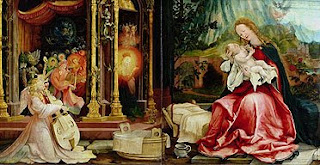
Of all the joys upon this earth
None has for men a greater worth
Than what I give with my ringing
And with voices sweetly singing.
There cannot be an evil mood
Where there are singing fellows good,
There is no envy, hate, nor ire,
Gone are through me all sorrows dire;
Greed, care, and lonely heaviness
No more do they the heart oppress.
Each man can in his mirth be free
Since such a joy no sin can be.
But God in me more pleasure finds
Than in all joys of earthly minds.
Through my bright power the devil shirks
His sinful, murderous, evil works.
Of this King David's deeds do tell
Who pacified King Saul so well
By sweetly playing on the lyre
And thus escaped his murderous ire.
For truth divine and God's own rede
The heart of humble faith shall lead;
Such did Elisha once propound
When harping he the Spirit found.
The best time of the year is mine
When all the birds are singing fine.
Heaven and earth their voices fill
With right good song and tuneful trill.
And, queen of all, the nightingale
Men's hearts will merrily regale
With music so charmingly gay;
For which be thanks to her for aye.
But thanks be first to God, our Lord,
Who created her by his Word
To be his own beloved songstress
And of
musica a mistress.
For our dear Lord she sings her song
In praise of him the whole day long;
To him I give my melody
And thanks in all eternity.
A Preface to All Good Hymnals Martin Luther 1538
 "Singing is the finest art and practice. He who is singing has no quarrel with the world and is not concerned with contentions in a law court. Singers are neither worried nor sad but shake all cares from their souls."
"Singing is the finest art and practice. He who is singing has no quarrel with the world and is not concerned with contentions in a law court. Singers are neither worried nor sad but shake all cares from their souls."



